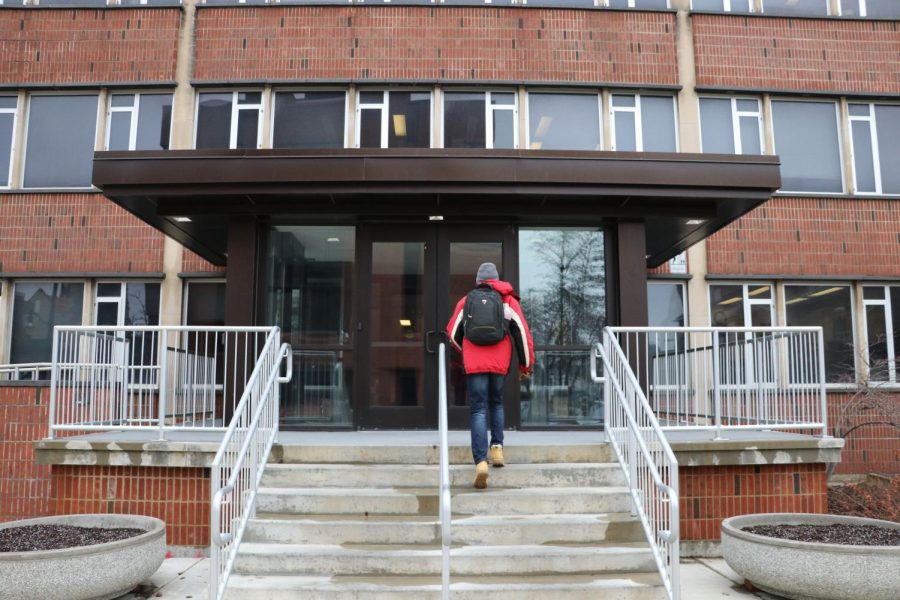Taking care of mind, body essential to mental heath
A student walks into the Turner Student Service Building on Feb.21. The Counseling Center is located in the building.
March 2, 2018
Mental illnesses can weigh heavy on college students amid the other responsibilities they have.
Mental health disorders such as anxiety or depression are not a new health concern; however, there is a mental health crisis in the student community, and it lacks an effective plan of action, said Shyam Gannavaram, instructor with the International Association for Human Values.
“It’s the state of our mind that determines the quality of our life,” Gannavaram said.
Gannavaram believes our education system is missing the indoctrination of key life skills that allow students to take better care of the mind and to handle the plethora of emotions they feel.
According to a survey by the American Psychology Association, 70 percent of university counseling center directors believe the number of students with severe psychological problems on their campus has increased in the past year.
Get The Daily Illini in your inbox!
Billy Vermillion, an academic adviser in the psychology department, said college is an extremely stressful time that can lead to students developing immediate problems or that can exacerbate older issues.
Vermillion helps students with class scheduling and career planning but frequently assists students with problems of depression, anxiety and stress.
“Sometimes, in certain circumstances, I will walk students over to the Counseling Center,” Vermillion said.
He said the Counseling Center is the most helpful resource on campus for mental health problems. Vermillion also believes while talking to professionals about deeper issues and concerns is extremely helpful, the power of healthy habits and a support network must not be discounted.
“Taking time to relax and recharge is important, making sure you’re getting enough sleep and that you eat healthy,” Vermillion said. “Another outlet is being able to talk to friends and family about problems you may have. Support networks are really important, friends and family, because it’s easy to feel alone.”
Eating a well-balanced diet, sleeping for seven hours and exercising five days a week are among lifestyle changes recommended by the World Health Organization in a report on promoting mental health.
Gannavaram also emphasized the importance of taking care of the body, but added that taking care of the mind as a separate entity is equally important.
“Just like people take a shower every day, they clean their body, feed their body and give rest to the body, they should find a way to energize their mind, clean their mind and give rest to the mind,” Gannavaram said. “Meditation is the way to give deep rest to the mind.”
Stress arises in our lives as a result of having too many commitments and not being “able to deal with the business in our life,” Gannavaram said.
He understands students may not always be able to control how much work or time they have, but what students can control is energy levels.
Gannavaram recommends finding ways to successfully recharge energy levels by either fulfilling endeavors that are empowering or engaging in meditation and breathing exercises.
For Gannavaram, meditation is a tool backed by science.
He said meditation has proven to relieve anxiety and depression, increase levels of optimism, decrease stress and improve emotional regulation.
“The mind itself is like an unstrung kite: It is all over the place. The wind, equivalent to our thoughts, blows it one way and another and everywhere,” Gannavaram said. “But we can learn to anchor it, steady it, stabilize it using a string which is the breath.”
Gannavaram said meditation is an intangible, subtle, yet powerful art that requires consistent practice, but that it will allow students to thrive in spite of being in a very, very demanding environment.
“Know your breath, know your life,” is one of Gannavaram’s mantras.
Both Vermillion and Gannavaram agreed the community and education system is not collectively invested in uplifting the mental and emotional well-being of students. They both said it has a long way to go.
Gannavaram stressed the importance of mental health awareness.
“We have to acknowledge that mental health of our community and society requires a lot of work,” Gannavaram said. “As our mind is very powerful, it can be our best friend or our worst enemy if we don’t culture it, and that is where meditation comes in, helping us lead truly healthier and happier lives.”







